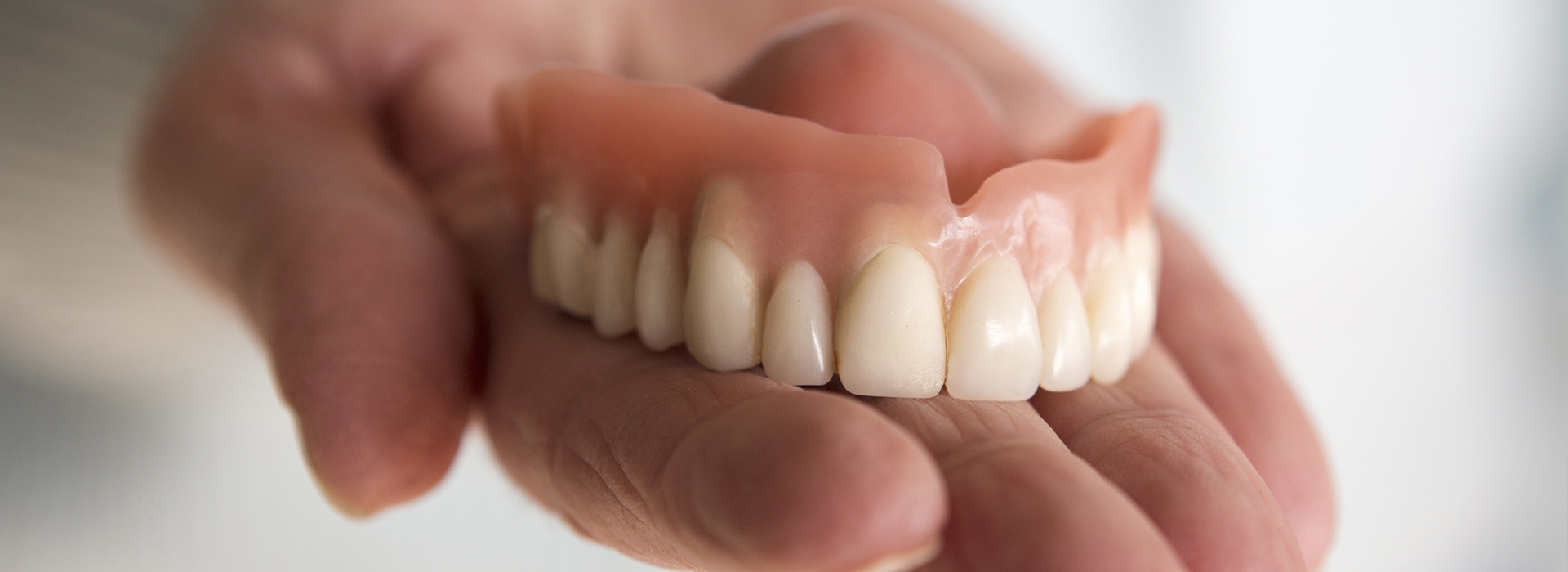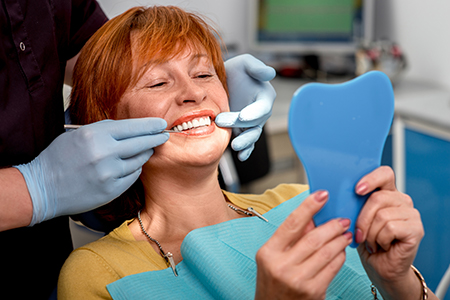New Patients
(865) 876-7050
Existing Patients
(865) 947-2220

Advances in dental materials, digital planning, and prosthetic techniques have made replacing missing teeth more predictable and natural-looking than ever. Although dental implants and modern bridgework offer long-term fixed options, removable dentures continue to be a practical and reliable choice for many patients who want to restore function and appearance.
At Kennedy Dentistry, we craft dentures using durable materials and careful attention to detail so each appliance fits comfortably and complements a patient’s facial features. Our goal is to provide prostheses that let patients speak, eat, and smile with renewed confidence while preserving oral health.
We focus on individualized care: matching denture style and design to a patient’s medical history, oral condition, daily habits, and aesthetic goals so the final result meets functional needs and feels like a natural part of life.
Losing one or more teeth affects more than just your smile. Missing teeth change how forces are distributed during chewing, which can reduce efficiency when eating and place added stress on remaining teeth. These changes can make everyday tasks, like enjoying a balanced meal, more difficult over time.
Tooth loss also influences facial support: when teeth and their roots are absent, the jawbone beneath can gradually resorb, and soft tissues may lose some of their previous fullness. This process can subtly alter facial contours and make the lower face appear collapsed or aged.
Beyond physical effects, missing teeth can affect speech clarity and self-confidence. People often notice shifts in how they pronounce certain sounds or may avoid social situations because they feel self-conscious. Replacing missing teeth sooner rather than later helps protect nearby teeth, maintains oral function, and supports overall well-being.
Whether a single tooth is lost or an entire arch is missing, a thoughtfully designed prosthesis can restore essential function and help maintain the health of the remaining dentition and oral tissues.

Removable dentures are custom-made appliances composed of artificial teeth set into a supportive base that rests on the gums. The base is shaped to follow the contours of the mouth and can be designed to blend with surrounding tissues for a natural appearance.
These prostheses can replace a few missing teeth (partial dentures) or an entire upper or lower arch (complete dentures). Because they are removable, patients can take them out for cleaning and overnight rest, which makes maintenance straightforward and helps protect oral tissues.
Removable dentures differ from fixed solutions such as bridges or implant-retained crowns. While implants and bridges provide permanent anchorage, removable dentures can be adapted, relined, or modified as tissue conditions evolve, offering flexibility for changing oral-health needs.
Choosing the most appropriate denture begins with a careful clinical evaluation of your remaining teeth, gum tissues, and bone support. Our team considers factors such as the number and position of natural teeth, bite relationships, and the condition of supporting tissues to determine whether a partial or full denture is the best fit.
Partial dentures are designed to fill gaps when some healthy teeth remain and are often retained with discreet clasps or precision attachments. Full dentures replace all teeth in an arch and rely on tissue contact, suction, and, when needed, supplemental methods of retention to stay secure.
Materials and design options have broadened in recent years. Frameworks can be crafted from cast metal, flexible resins, or hybrid materials to balance strength and comfort. Tooth shapes and shades are selected to harmonize with the patient’s facial characteristics and expectations for appearance and function.
Complete (full) dentures restore an entire upper or lower arch. Design choices depend on tissue anatomy, the presence of anatomical undercuts, and the patient’s priorities for comfort and esthetics. A thorough treatment plan accounts for how the denture will support speech and chewing as well as facial contours.
Conventional full dentures are made after any remaining teeth have been extracted and the tissues have healed. Waiting for healing can improve the final fit because the gums and bone have stabilized, but the process requires planning and follow-up to ensure the prosthesis aligns well with the healed ridge.
Immediate denture
An immediate denture is inserted at the time of tooth removal so a patient does not go without teeth during the healing period. Although it provides immediate esthetic benefits, it often needs subsequent relines or adjustments as the tissues remodel and settle.
Overdenture
An overdenture is supported in part by remaining tooth roots or specially prepared abutments. By retaining strategic roots or attachments, an overdenture can preserve bone and improve stability compared with a conventional tissue-supported denture.
Implant-supported denture
Implant-supported dentures attach to dental implants placed in the jaw, which adds significant retention and reduces movement during function. This option can enhance chewing ability and comfort for patients who are good candidates for implant therapy.
Partial dentures are an effective way to replace several missing teeth while preserving the healthy ones that remain. They help restore the bite, prevent neighboring teeth from drifting, and reestablish the appearance of a complete smile.
Design choices for partials include traditional clasp-retained frameworks and more esthetic precision attachments. The best option depends on the number and distribution of missing teeth, the condition of the abutment teeth, and the patient’s priorities regarding appearance and ease of cleaning.
At Kennedy Dentistry, we evaluate each case carefully to recommend a partial design that balances durability, comfort, and hygiene so the prosthesis supports oral health and daily function for years to come.

Creating a successful denture is both a technical and artistic process. It begins with a comprehensive exam and diagnostic records to document how the jaws relate, the condition of tissues, and the factors that will influence fit and stability.
When necessary, preliminary treatments—such as periodontal care, restorative work, or extractions—are completed to optimize the foundation for a prosthesis. In some cases, minor surgical adjustments to the bone or soft tissue are advised to improve comfort and long-term fit.
Impressions, trial fittings, and bite registrations are performed to fine-tune tooth position, speech, and occlusion. Clear communication between the patient, clinician, and laboratory technician is essential so the denture reflects both functional needs and aesthetic preferences.
Following insertion, scheduled follow-up appointments allow the team to make adjustments and address any sore spots or functional concerns. Periodic reviews also ensure remaining oral tissues remain healthy and that the prosthesis continues to perform as intended.

Adapting to a new denture takes a little patience. In the first days or weeks, patients commonly notice increased saliva production and minor changes in speech. These reactions are normal and usually diminish as the mouth adapts to the prosthesis.
Speaking and eating may feel different at first; practicing by reading aloud and starting with soft, easy-to-chew foods helps rebuild confidence. Over time, most patients regain a comfortable level of function and can return to their usual diet with some adjustments.
Proper daily care extends the life and performance of a denture. Rinse and brush the appliance after meals, soak it nightly in water or a recommended cleanser, and gently clean any remaining natural teeth and soft tissues. Removing dentures at bedtime gives oral tissues a healthy rest.
Adjusting to wearing a new denture
Minor sore spots are common during the initial adjustment period. If irritation occurs, wearing the denture until your adjustment appointment helps the dentist identify and relieve the specific areas causing discomfort.
More saliva than usual
Temporary overproduction of saliva is a normal response to a new appliance and typically settles as the mouth becomes accustomed to the denture.
Speaking with ease
New dentures may slightly change how you shape certain sounds; practicing by speaking aloud and reading helps speed the adjustment so conversation feels natural again.
Getting used to eating with a denture
Begin with soft, bite-sized foods and chew on both sides to keep pressure balanced. As you adapt, you’ll find you can enjoy a wider variety of foods with improved comfort.
Taking care of your dentures
Keep your denture clean by rinsing after meals and brushing it daily. Use a denture brush or a soft toothbrush and avoid abrasive cleaners. When not worn, store dentures in water to prevent warping and follow the manufacturer’s or clinician’s guidance for periodic deep cleaning.
Brush any remaining natural teeth and gently cleanse gums and the roof of the mouth to maintain healthy tissues and a stable foundation for the denture.
Remove dentures overnight to give tissues a rest and reduce the risk of irritation or infection. Regular removal also supports natural cleansing of the mouth.
Added stability
Some dentures benefit from extra retention. Options include adhesives for short-term support, implant attachments, or precision clips that connect to underlying abutments — all intended to reduce movement and improve function.
Follow-up care
Routine dental checkups allow the team to monitor tissue health, assess the fit of the denture, and make necessary adjustments. These visits help preserve oral health and ensure the prosthesis continues to meet your needs.
Relines
As the jaw and gums change over time, a reline can restore the fit and comfort of a denture by adapting the inner surface to new tissue contours, extending the useful life of the appliance.
Our team is committed to providing attentive, evidence-based care so your transition to a denture is as smooth as possible. If you have questions or concerns about getting a denture or caring for one you already wear, please contact us for more information.
Today, it’s easier than ever to replace missing teeth and achieve natural-looking, durable, and long-lasting results! Depending on a patient’s dental needs, lifestyle, expectations of care, and budget, choices can include conventional fixed bridgework, dental implants, or removable partial and complete dentures. At the office of Kennedy Dentistry, we’ll discuss all your options in care and answer all your questions as you choose the solution that’s right for you.
With advances in dental materials and technology, today’s dentures are more comfortable and realistic-looking than ever before.
Whether you wear partial or complete dentures, it’s essential to see the dentist for routine care. Besides checking the fit and condition of your dentures and making any necessary adjustments, you’ll also receive a comprehensive exam to check on the health of any remaining teeth as well as the soft and hard tissues in and around the oral cavity.
A same-day denture offers an accelerated design and fabrication process that allows a patient to go from impression taking to denture insertion in a single day.
For patients who don’t want to wait after having teeth extracted, an immediate denture can be inserted the same day your teeth are removed. Sometime later you may need the denture relined to address any changes in its fit once the extraction sites have completely healed.
While no one wants to drop or break a partial or complete denture, accidents do happen. The good news is that in some cases, your partial or complete denture is reparable. It all depends on the extent of the damage. Don’t hesitate to contact our office if you’ve broken or damaged your denture. We’re happy to help.
The simple act of taking your partial denture in and out can cause certain types of metal clasps to loosen over time. When you come in for your checkup visit or contact our office for an adjustment, we’ll assess the fit of your partial and tighten the clasps for improved stability and comfort.
While rebuilding a complete smile is a worthwhile investment, our office is sensitive to the costs involved in dental care. We customize care and will discuss which treatment options address your needs, lifestyle, and budget. How much a new denture will cost depends on the type of the prosthesis, its design, and the materials used to fabricate the supportive base, teeth, and clasps or precision attachments. Dentures that include the placement of dental implants for added retention and stability typically involve additional costs.
If you have dental insurance, your coverage may include a new or replacement set of dentures. Our staff is happy to review your coverage with you to ensure you are maximizing your insurance benefits while minimizing any out of pocket expenses.
At the office of Kennedy Dentistry, we provide an extensive range of dental services, including the latest and most effective methods to help patients with missing teeth rebuild complete and beautiful smiles. As skilled and experienced professionals, we recognize that every patient is different, and every smile is unique. We’re passionate about what we do and take great pride in providing personalized treatment plans while treating our patients as valued partners in care.
